#greece
Text
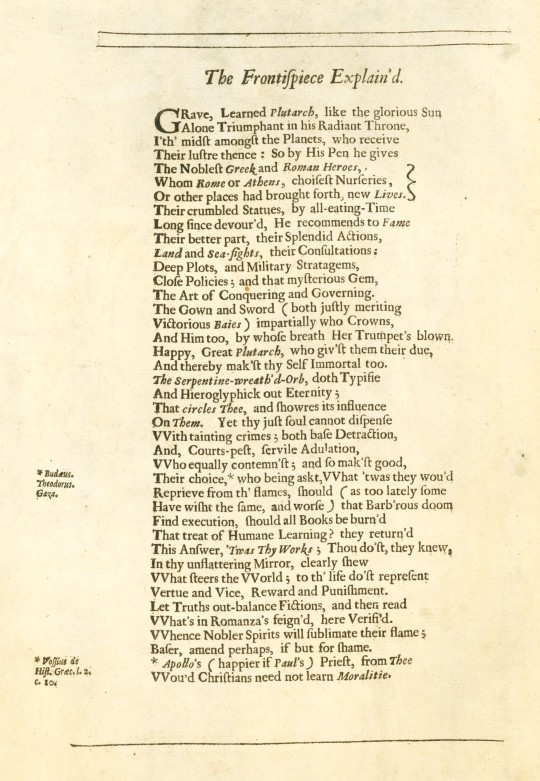
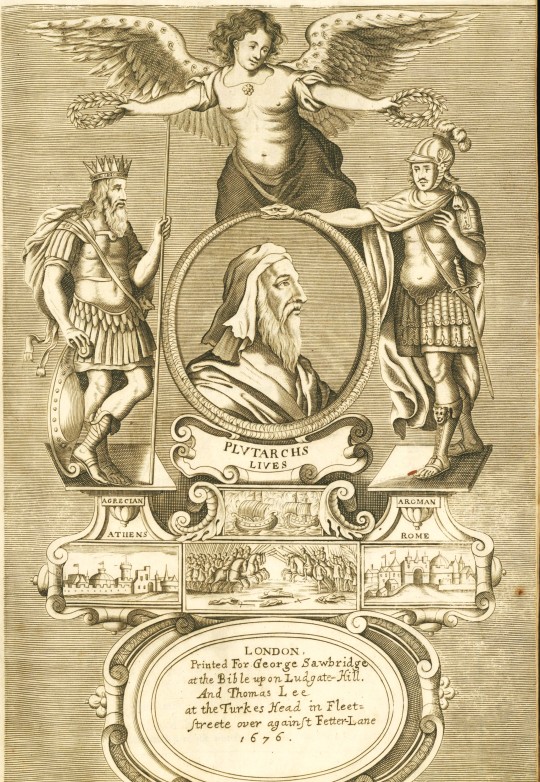

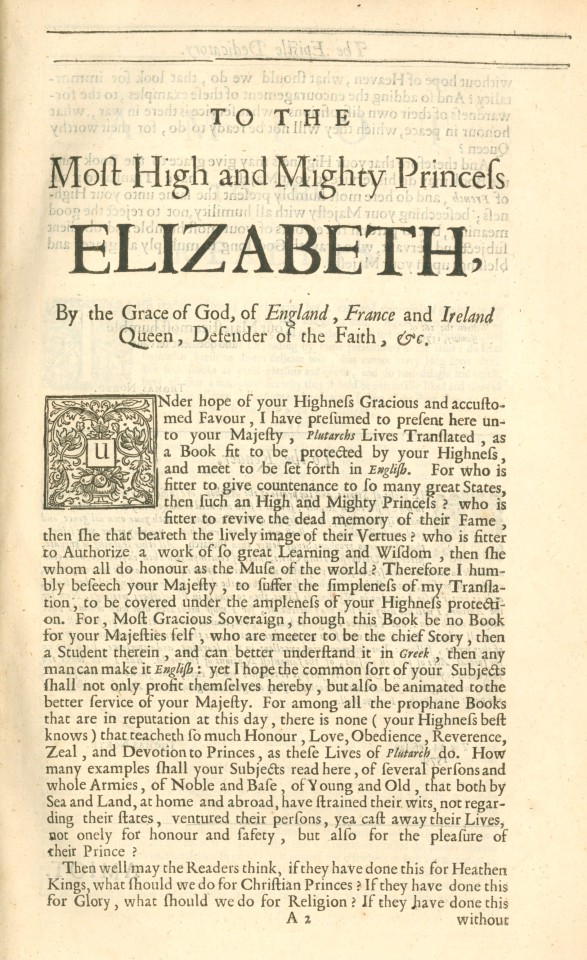

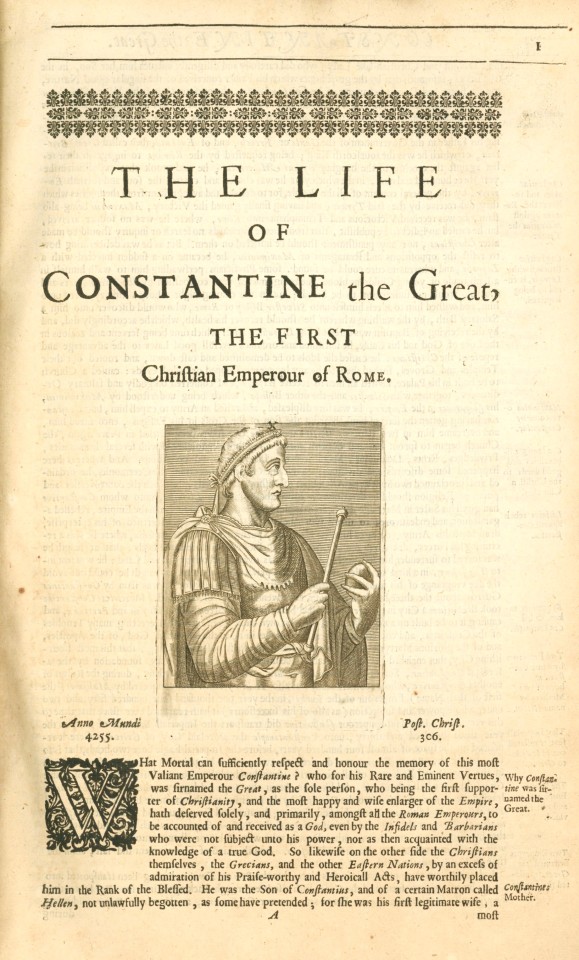

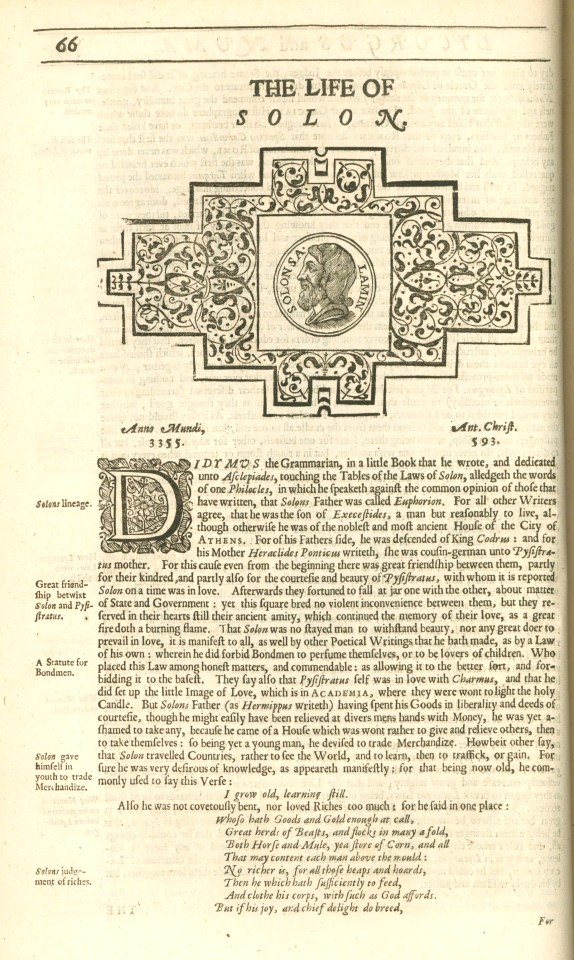
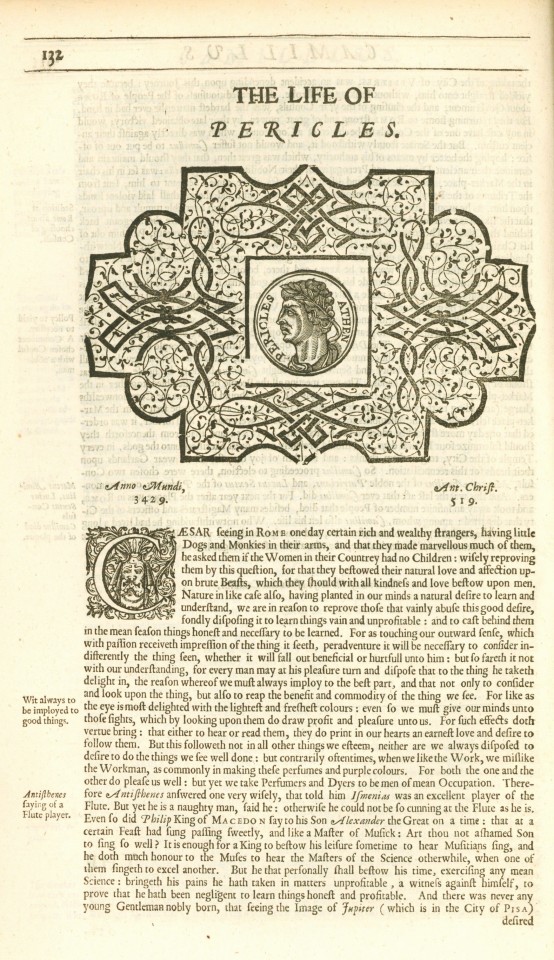
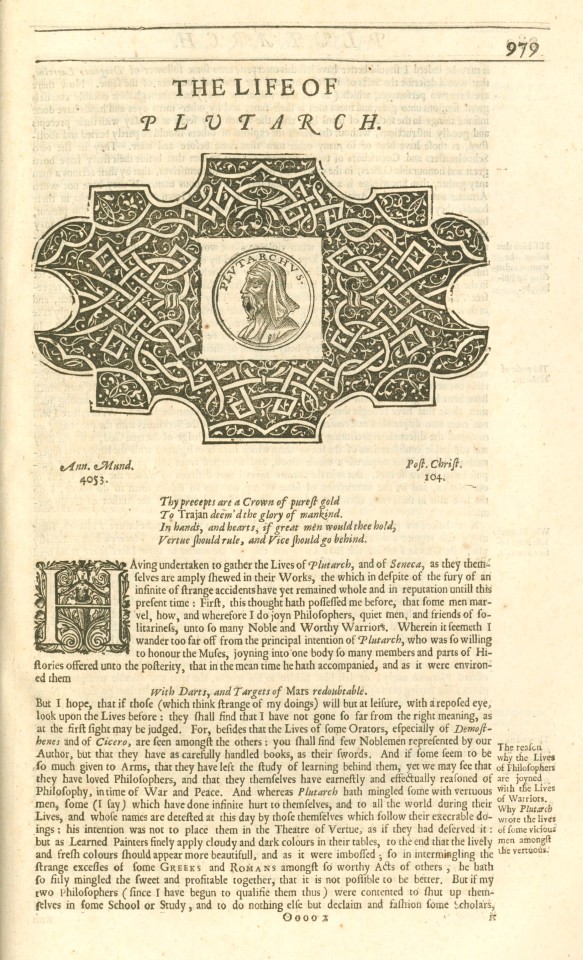
Classic Profiles
This is a 1676 edition of The Lives of the Noble Grecians and Romans, compared together by the 1st-century BCE Greek philosopher and historian Plutarch of Chaeronea, printed by the printer to the University of Cambridge John Hayes for the bookseller George Sawbridge. Originally written in Greek, Plutarch's Lives appeared in print for the first time as a Latin translation in 1470, and this English translation by Sir Thomas North was first published in 1579 from a French translation by James Amiot (Jacques Amyot). The text is a collection biographies of famous Greeks and Romans, including Alexander the Great, Pericles, Tiberius Gracchus, and Cicero. These figures left an indelible mark on history, their lives and achievements shaping the world as we know it.
Sir Thomas North (1535 – c. 1604) was an English translator and lawyer significantly contributing to English literature. His translation of Plutarch's Lives served as the primary source text for William Shakespeare's Roman plays, a testament to his work's enduring influence. This translation is regarded as one of the earliest examples of exceptional English prose. It was followed by another edition in 1595, which included updated biographies. A third edition of North's Plutarch was published in 1603, including even more translated Parallel Lives and a supplement of other biographies.
Jacques Amyot (1513-1593), a French scholar, writer, and translator, made substantial contributions to the field of translation and literature. His work on the translation of Plutarch's Lives (1559-1565) was instrumental in shaping the literary landscape of his time and laid the foundation for future translations and interpretations of Plutarch's work.
The first edition of this book was dedicated to Queen Elizabeth I. This dedication reflects the book's significance and provides a glimpse into the political and cultural landscape of the time, adding another layer of depth to the reader's understanding. Plutarch’s Lives helped shape the understanding of the classical Greek democracies and oligarchies of the Roman Republic and the role attributed to their founders—among them the legendary Lycurgus of Sparta and the Athenian lawgiver Solon.
-Melissa, Special Collections Classics Intern
View other Classics posts
#classics#greek posts#greece#roman#cambridge#plutarch#ancient greece#roman republic#alexander the great#lycurgus#solon#queen elizabeth i of england#biography#sappho#constantine the great#pericles#Thomas North#James Amiot#Jacques Amyot#John Hayes#university of cambridge
93 notes
·
View notes
Text
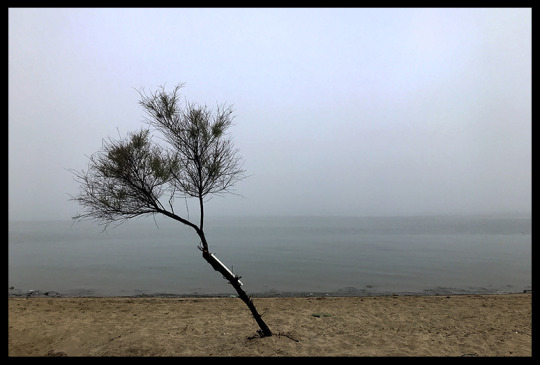
baxe
© 2024 Yiannis Krikis
71 notes
·
View notes
Text
#comic con#mcu loki#scifi#punk#cookie run kingdom#forever 21#greece#foster the people#prince zuko#Dracula#celebs#love in the air#off game#alex claremont diaz#startup
125 notes
·
View notes
Text
#tf2#ray toro#Ernest Hemingway#sheep#skeleton#romantic quotes#nami#christina ricci#katsudeku#greece#duchess of cambridge#Spring 2018#black stories
129 notes
·
View notes
Photo
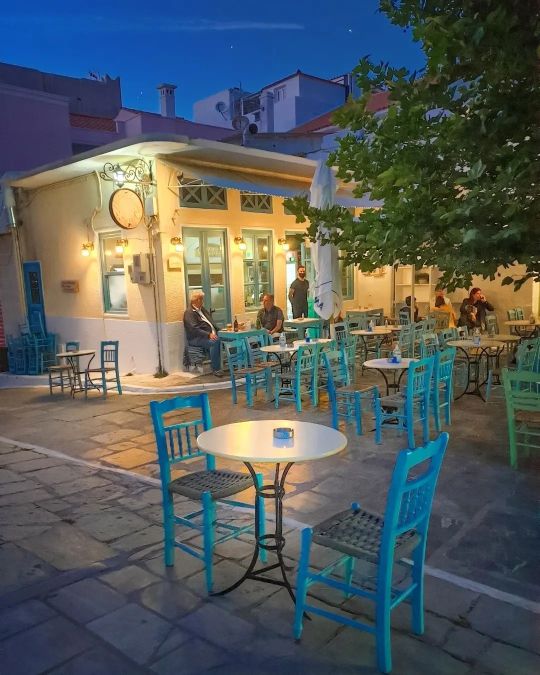
This table there is calling my name. Andros island, Greece by Giannis Tsounis (Blueman)💦
#greece#europe#travel#wanderlust#traditional#shop#town#andros#cyclades#cycladic islands#greek islands
56 notes
·
View notes
Text
https://donna-643.mxtkh.fun/dy/zHkrnUu
#christina ricci#cookie run kingdom#house of the dragon#greece#duchess of cambridge#black stories#[adult swim]#sissi cocklover#alexa breit#spicy memes#Dracula#lovesick#faberry#perks of being a wallflower
131 notes
·
View notes
Text

Cuprian Adamite, conichalcite, Greece, photo by Toth Laszlo
55 notes
·
View notes
Text

#Santorini#Greece#luxury home#modern home#modern architecture#Luxury#luxury life#luxury living#aesthetic#decor#home decor#lifestyle#lifestyle blog#photography#home & lifestyle#architecture#classy#classy life#home#Sunset
46 notes
·
View notes
Text
a post in honor of lord byron's 200th death anniversary —
the greeks were very fond of byron, who when he died in 1824 was a military commander and notable influence in their war of independence. as one of the most (if not the most) famous members of the philhellenist movement, byron used his poetic platform to try to remind people of greece's reputation as the source of western traditions in art and culture. the greeks then honored byron by decorating his coffin with a laurel wreath (below). they also erected statues for him, like this one below in athens depicting him being crowned with a laurel wreath (a symbol of greatness, especially in poetry/music [which historically overlapped]) by a female personification of greece. to this day, some statues of byron are annually wreathed in tradition, and the names byron/vyron/vyronas are still used in greece for roads, towns, and people in his honor.
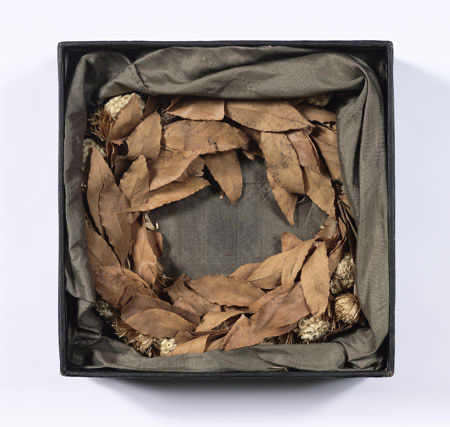

"’Tis sweet to win, no matter how, one’s laurels,
By blood or ink; ’tis sweet to put an end
To strife; ’tis sometimes sweet to have our quarrels,
Particularly with a tiresome friend:
Sweet is old wine in bottles, ale in barrels;
Dear is the helpless creature we defend
Against the world; and dear the schoolboy spot
We ne’er forget, though there we are forgot.
But sweeter still than this, than these, than all,
Is first and passionate love — it stands alone,
Like Adam’s recollection of his fall;
The tree of knowledge has been pluck’d — all ’s known —
And life yields nothing further to recall
Worthy of this ambrosial sin, so shown,
No doubt in fable, as the unforgiven
Fire which Prometheus filch’d for us from heaven."
— excerpt from Lord Byron's Don Juan, Canto the First (writ 1818, pub. 1819).
"The mountains look on Marathon –
And Marathon looks on the sea;
And musing there an hour alone,
I dreamed that Greece might still be free;
For standing on the Persians' grave,
I could not deem myself a slave."
— excerpt from Lord Byron's Don Juan, Canto the Third (writ 1819, pub 1821) — this stanza is part of a section often published on its own under the title "The Isles of Greece."
"Byron was at once a romantic dreamer, who wanted life to square up to his illusions, and a satirical realist, who saw what was before him with unusual clarity and found its contradictoriness amusing. The clash between the two Byrons is nowhere more noticeable than in his last writings, done on Cephalonia and at Missolonghi during the months before his death. There we see the Greece he dreams of, and the Greece which, in different ways, destroys him."
— excerpt from Peter Cochran's "Byron's Writings in Greece, 1823-4."
"Oh, talk not to me of a name great in story;
The days of our youth are the days of our glory;
And the myrtle and ivy of sweet two and twenty
Are worth all your laurels, though ever so plenty.
What are garlands and crowns to the brow that is wrinkled?
'Tis but as a dead-flower with May-dew besprinkled.
Then away with all such from the head that is hoary!
What care I for the wreaths that can only give glory!
Oh FAME! - if I e'er took delight in thy praises,
'Twas less for the sake of thy high-sounding phrases,
Than to see the bright eyes of the dear one discover,
She thought that I was not unworthy to love her.
There chiefly I sought thee, there only I found thee;
Her glance was the best of the rays that surround thee;
When it sparkled o'er aught that was bright in my story,
I knew it was love, and I felt it was glory."
— Lord Byron's "Stanzas Written on the Road Between Florence and Pisa" (November, 1821). What is illustrated here, and what I try to illustrate all throughout this assortment, is Byron's conflation of love and glory, and the idea that poetry and politics are both ways to deserve and achieve — not fame, but what fame seems to promise — love.
"But 'tis not thus—and 'tis not here
Such thoughts should shake my Soul, nor now,
Where Glory decks the hero's bier,
Or binds his brow.
The Sword, the Banner, and the Field,
Glory and Greece around us see!
The Spartan borne upon his shield
Was not more free.
Awake (not Greece—she is awake!)
Awake, my Spirit! Think through whom
Thy life-blood tracks its parent lake
And then strike home!"
— excerpt from Lord Byron's "On This Day I Complete My Thirty-Sxith Year" (1824).
"What are to me those honours and renown
Past or to come, a new-born people's cry
Albeit for such I could despise a crown
Of aught save Laurel, or for such could die;
I am the fool of passion, and a frown
Of thine to me is as an Adder's eye
To the poor bird whose pinion fluttering down
Wafts unto death the breast it bore so high –
Such is this maddening fascination grown –
So strong thy Magic - or so weak am I."
— although the much more popular and published "On This Day I Complete My Thirty-Sxith Year" is often believed to be Byron's last poem, the above is likely Byron's actual last poem. Like the former, it wasn't solely written for Greece, but for his page Lukas Chalandritsanos who he was in unrequited love (or lust) with. It is sometimes titled "Last Words on Greece" (named so by his friend and sometimes-editor Hobhouse).
#queud#literature#english literature#lord byron#romanticism#history#dark academia#poetry#aesthetic#greece#greek#greek history#poems#lit#on this day#byron#byronism#academia#greek war#war#web weaving
25 notes
·
View notes
Text

santorini / @anaelisabetaxx
25 notes
·
View notes
Text

Greek novelist Auguste Corteau and his husband Anastasios Samouilidis, the first homosexual couple to be married at Athens' city hall, March 7th 2024
31K notes
·
View notes
Text
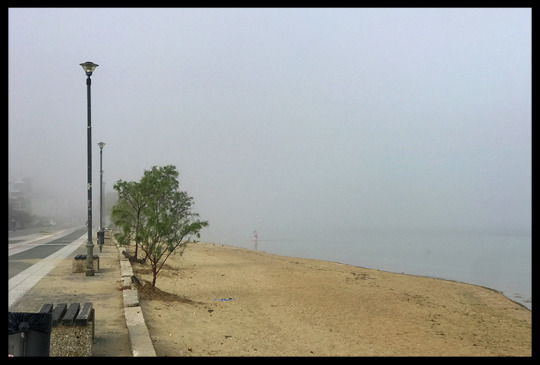
baxe
© 2024 Yiannis Krikis
44 notes
·
View notes
Text


Source
Some good news
#lgbt#lgbtq rights#gay marriage#Greece#Europe#news#current events#politics#government#the left#progressive#lgbtq community#good news
25K notes
·
View notes
Text


While every force available in the world is searching for the 5 people in the oceangate submersible, a boat filled with mostly Syrian and Pakistani refugees sank under still “unknown” circumstances off the coast of Peloponnisos, Greece (with the coast guard present). More than 600 people drowned but guess which of the two is making headlines
70K notes
·
View notes
Photo

📍Pollónia (milos island)💦🍉🇬🇷 || Giannis Tsounis (Blueman)💦
#greece#europe#travel#beach#town#village#coastal#architecture#pollonia#milos#cyclades#cycladic islands#greek islands
27 notes
·
View notes
